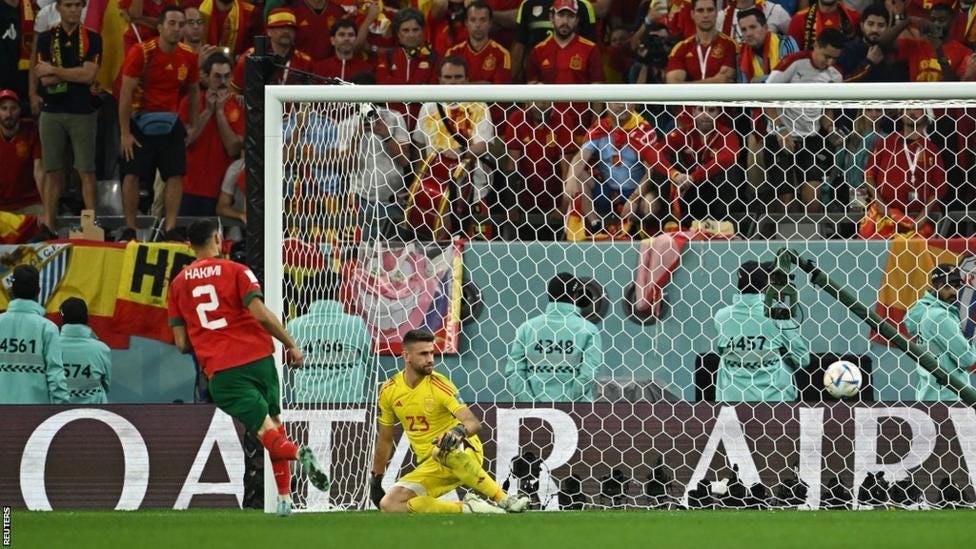Achraf Hakimi stands still. He’s concentrated. Everyone around him is either in agony or ecstasy, hardly aware of time, place, or event. It’s one of those rare moments that exist in a vacuum—completely secluded from everything before or after. And Achraf Hakimi is standing still.
The ball is chipped, and like a weak rainbow, it hovers across the line, past Spanish keeper Unai Simon. Living rooms explode, the stadium explodes, and the streets explode. Morocco beats Spain. Morocco beats Spain. Africa beats Europe. Morocco beats Spain.
Sure, this isn’t the golden generation from Spain. No Xabi or Xavi. None of the Davids either. But still, Morocco beating Spain is a massive moment in history, not just football history.
People of privilege often tend to live in a fantasy world in which sports, media and culture exist in a vacuum. As if politics and societal shifts should stay out of the arenas. Yet, the players performing in these arenas are wearing the colours and crests of their nation state, in front of representatives of those nation states, all the while these performances are being broadcasted by the nation’s national broadcast station.
The crazy thing is that even the organizations active in these fields, the very ones responsible for administering the games such as FIFA, NFL, UEFA or KNVB think sports exist in a vacuum. They don’t care if you’re gay, black, or belong to any other marginalized group, as long as you don’t show it in their arenas, because the arenas are utopian worlds where, according to them, no politics exist.
However, when Serbia plays against the Kosovan players of Switzerland, suddenly, politics enter the pitch. When Black players decide to take a knee during the national anthem played before every game (ahum), (not so) suddenly, politics enter the field. When the Moroccan players, with 14 out of 26 born in another country, face the dominant nation from across the Mediterranean, politics, or at the very least, sentiments, are very much in play.
From the illustrious city of Tangier, one can see already see Spain on its horizon. A European tease across the sea, with a looming “better future” that was promised to so many Moroccans and other Africans. Spain alone has a diaspora of around 800,000 Moroccans, while the total amount of Moroccans in Europe is estimated around 5 million.
Many of those Moroccans in Europe deal with racism. Many of them are descendants of lower or non-educated migrant workers who came to Europe in the second half of the 20th century. Many of them are Muslim. Many of them enjoy football.
From a Western European perspective, arguments can be made that the work migration project that started in the 1960s has failed. The migrant workers, also from Turkey and other north African countries settled in Europe. Raising families and grandchildren who grew up between cultures. With anti-Muslim and anti-immigration sentiments running rampant throughout the Western world in recent decades, the tensions between the dominant white cultures and people with migration backgrounds has been rising. Adding fuel to the firy mess that is identity nowadays.
That mess, has undeniably helped shape this Moroccan football team. While “European” players playing for the country of their parents is not new, as it often is a great second chance to play internationally if not good enough for the European selection, the difference with this squad is that its star players chose Morocco over their native country. In lieu of acceptance and integration, the lackluster tolerance attitude many European countries have against Moroccans helps to push them away, making them outsiders and outkasts in a society that is already on edge. Because of that, when choosing between Turkey or Germany, Morocco or The Netherlands, Belgium or Congo, France or Senegal, it is often a matter of the heart, rather than the head.
From its coach to its star players, some of the men from the Moroccan team could have played for their birth country, but chose otherwise. In 2015, when one of Morocco’s stars Hakim Ziyech was playing for FC Twente, he was called up for the Dutch national team, in hopes to wear Oranje. However, not long after, Ziyech was seen on the the field of Adrar Stadium in Agadir, making his official debut for Morocco against Ivory Coast.
According to Ziyech, he never had the respect he deserved as a player of Moroccan descent in the Netherlands, emphasizing that many young Moroccan players are labeled as “talented, but difficult.” Seven years later, Ziyech’s choice for Morocco is still seen as a Dutch tragedy in the Netherlands, especially since the Dutch team failed to qualify for two consecutive tournaments in the period after the saga.
When the other big star of the Moroccan team, Achraf Hakimi, born and raised in Madrid, was climbing the ranks of Los Blancos at Real Madrid and being invited by the Spanish Federation, he kindly rejected, claiming he didn’t feel at home with his Spanish peers. An X amount of transfers among world class clubs and 58 caps later, he chips a ball past Unai Simon, the keeper of Spain, who (only a year older) might have been one of his teammates at the Spanish youth teams.
If only they made him feel at home. If only there were no politics in sports.




